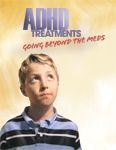Child ADHD: Going beyond the medications
Medication remains the mainstay of pediatric ADHD treatment. But these efforts can be complemented by non-medication approaches, targeted at the major areas of functioning in a child's life.

The purpose of this article is not to review this good work, or to summarize medication approaches. Instead, this article will present clinical approaches that can be used in conjunction with medication to improve the quality of life for children and families coping with ADHD. Focus will be placed on the major areas of functioning in a child's life-self-esteem, family life, peer relationships, school, and activities-with the goal of offering management suggestions for pediatricians and parents (see Parent Guide).
SELF-ESTEEM

In today's society, the stream of real and perceived criticism on a child with ADHD can be massive and unrelenting. As a culture, we highly value sustained attention and control of impulsivity. As we raise educational standards, we have often asked children at younger ages to stretch their academic skills and attention. This is done in the hope that learning earlier will result in learning better or learning more over time.
But even without accelerated expectations, children with ADHD are challenged, especially in school. "Sit still," "Do your work," "Get in line," "Stop fooling around," "Pay attention," "Check your work," "Raise your hand," "Be neat," "Leave him alone," "Wait your turn," etc. If only three of these comments were made during each school period, it would add up to 100 a week, 3,600 a year, and 10,000 by the end of second grade. Add to this burden the disapproving looks, overheard comments, peer and sibling teasing, as well as parental, verbal, behavioral, and for some, physical punishment, and one can easily appreciate the assault on a child's self-esteem.
Further complicating some children's struggle with ADHD are comorbid learning disabilities. These children have a greater likelihood of being criticized "for not trying harder." In this context, addressing and fixing the negative feedback loop between the child's behavior and the environment is one of the greatest benefits of medication. Medications, however, are not perfect. They do not address every area of the child's functioning, may be only partially effective, do not change learning disabilities, and may have peaks and valleys of effectiveness.
So what can pediatricians do, beyond optimal use of medication?
New research finds significant challenges for children with disabilities in foster care
September 27th 2024A study presented at the American Academy of Pediatrics 2024 National Conference finds children with disabilities in foster care face lower permanency rates and higher mortality risks, calling for specialized support and interventions.